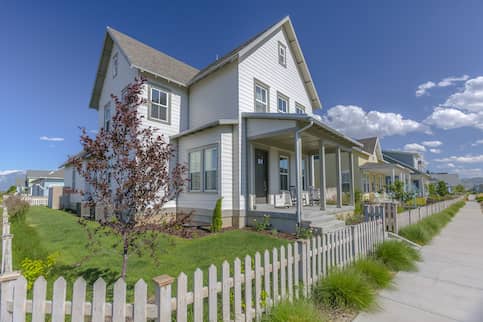You take on a lot of responsibilities when you buy a property. There’s insurance, moving expenses, upkeep, repairs, and settling into a new home. You also need to know and understand property rights and what they mean for you as an owner. Knowing which elements of your home are recognized as real property can be extremely helpful, whether you are considering moving to a new home or dealing with neighborhood issues.
Key Takeaways:
- Property rights allow the owner to do what they want with their property.
- Holding property rights means that you have possession of the property on both the deed and house title.
- The primary rights of property owners are possession, control, exclusion, enjoyment and disposition.
What Are Property Rights?
Property rights define what an owner can do with the real estate they own. The concept of ownership is both philosophical and practical, which means that the rights it bestows and the limits on those rights are interpreted by courts. Private property rights are not absolute, and homeowners need to be aware of their limits. Remember that businesses, governments and individuals can all own property.
Why Are Property Rights Important?
Property rights provide individuals and groups a legal framework to own, use, alter, rent out, sell or transfer their property as they see fit.
“Property rights are important because they provide legal ownership and thus control over one’s land, whether that’s an individual or a company,” says Seamus Nally, CEO of TurboTenant, a property management software company in Fort Collins, Colorado. “That means that if you own a property, people can’t simply come inside or mess around with your yard without your permission. You have legal recourse if they do. Property owners are given legal rights to do with their property what they like – considering the bounds of things like local permits when applicable – but nobody else can say the same.”
Types Of Property
There are three main types of property: real, personal and intellectual.
- Real property is attached to the land, like a home or a tree.
- Personal property can be tangible or intangible, like clothing, furniture or a vehicle.
- Intellectual property includes creations and inventions, like a patent or copyright.
What’s Your Goal?
Buy A Home
Discover mortgage options that fit your unique financial needs.

Refinance
Refinance your mortgage to have more money for what matters.
Tap Into Equity
Use your home’s equity and unlock cash to achieve your goals.
What Is Property Ownership?
Property ownership has been essential throughout history. Today, local governments carefully record property ownership because it’s how local taxes are determined. Since private property rights are determined through your house title and deed, let’s review what both terms mean.
House Title
The term “title” can be slightly misleading, as it’s not a physical document like a car title. House title is a representative concept of all the legal rights of ownership for residential property. House title can be seen as a “bundle of rights” that comes with being a property owner.
Deed
Unlike the house title, a deed is a legal document explicitly defining the property and its boundaries. It also serves as the transfer of property ownership from a seller to a buyer.
Ready To Become A Homeowner?
Get matched with a lender that can help you find the right mortgage.
Private Property Vs. Public Property
Private property refers to assets owned by individuals or entities for personal or business use. On the other hand, public property is owned and managed by governmental bodies or communities and intended for use by the general public.
3 Types Of Private Property Ownership: At A Glance
There are three types of private property ownership: joint tenancy, tenancy in common and community property.
1. Joint Tenancy
Joint tenancy is when two or more individuals own property together with equal rights. Should one owner die, their share is transferred to the surviving owner. This type of ownership is common among married couples.
2. Tenancy In Common
Tenancy in common is when two or more individuals own property together, but with separate and different shares. Each owner can sell or transfer their share independently. Should one of the owners die, their share is passed onto their heirs.
3. Community Property
A married couple’s assets are considered community property, which means that any property acquired during the marriage belongs to both parties equally. In the event of divorce, the property is divided 50/50.
Take The First Step To Buying A Home
Find a lender that will work with your unique financial situation.
5 Private Property Rights
When you own real estate, you have private property rights. Tenants who rent properties or apartments have tenant rights but not property rights. Property rights are sometimes referred to as a bundle of rights, so let’s discuss the five primary rights of property owners.
1. The Right Of Possession
The right of possession is your right to own your property. As the titleholder, you are the legal owner of the property and are responsible for it. Keep in mind that if you have a mortgage, your lender has a lien on your property until the mortgage is paid off. Homeowners current on their mortgage payments have the right to possess the property, but the homeowner in default loses the superior claim. If this is the case, the lender can take possession through foreclosure.
2. The Right Of Control
The right of control is your right to control the use of your property. However, it must be legal according to local laws. The right of control can include renovating, decorating your home or adding an outdoor fireplace gazebo if there are no ordinances against it. Homeowners associations often have regulations that can compete with a homeowner’s right of control.
3. The Right Of Exclusion
The right of exclusion is your right to determine who can enter your property and who can’t. While this may sound simple, easements – a legal right to use another individual’s property – and judicial warrants can override the property owner’s right of exclusion.
4. The Right Of Enjoyment
Like the right of control, the right of enjoyment is your right to do as you please while on your property, as long as it’s not against the law. With the right of enjoyment, you can throw birthday parties, play musical instruments and more.
5. The Right Of Disposition
The right of disposition is your right to sell, will or transfer the ownership of your property. If you still owe a lender on a mortgage, you must pay off the balance on your loan with the proceeds from the sale.
7 Limits To Private Property Rights
Having property rights does not give homeowners complete reign over their property. Often, disputes can happen between neighbors when one property owner does something that disturbs nearby property owners or the community at large. Let’s go over common restrictions on property rights, including zoning, local governments and state laws and ordinances.
1. Encumbrances
Encumbrances on property occur when a claim is made against a property by someone other than the property owner. These claims typically are made when a structure is built on more than one property.
2. Liens
A lien is a financial claim to a property. When you buy a home with a mortgage, your lender places a lien on the property, giving it the right to claim it through foreclosure if the borrower defaults. Once the debt is repaid, the lien is lifted.
3. Easements
An easement allows another party to access a property without express permission from the owner through a grant of a nonpossessory property interest. They can limit a property owner’s activities on their own property, as some easements can prevent property owners from adding certain developments to the property. For example, if you own property adjacent to a public beach, an easement may allow people to cross your property to access it.
4. Encroachments
An encroachment is when a neighbor unrightfully develops onto their neighbor’s property. Examples include landscaping or outbuildings that cross property lines. This can be intentional or not, but it can cause a nuisance. Encroachments can cause liability issues and potential damage to a property.
5. Claim Of Rights
Believe it or not, trespassers can claim rights to a property they don’t own through adverse possession. While the legality of adverse possession can be tricky, homeowners can prevent adverse possession. A couple examples of how to avoid this include clearly marking boundary lines and providing written permission of use to people using their property.
6. Eminent Domain
Eminent domain is the federal, state or local government taking private property by force for a public purpose. This occurs with proper compensation but without the owner’s consent. Homeowners’ rights regarding eminent domain are protected by the Fifth Amendment to the U.S. Constitution.
7. Deed Restrictions
Deed restrictions are a written agreement on how the owner can use a property. You cannot opt out of deed restrictions – you accept them by buying the property. A common type of deed restriction is membership in a homeowners or condo association. The deed restriction requires you to join the HOA, pay dues and follow its rules – even when they limit what you can do with your property. Some HOAs may require you to maintain a specific type of plant in the front yard or limit what colors you can paint your home’s exterior. Failure to pay HOA fees or penalties can allow the HOA to place a lien on your property and potentially foreclose if the issue isn’t resolved.
Other Legal Limits To Consider: At A Glance
State, county and municipal laws also can limit what you can or can’t do with your land.
State and local laws
Both state and local laws can prohibit an activity if it’s deemed a health or safety hazard. For example, hydraulic fracturing was banned in the state of New York due to concerns over the health and safety of its residents.
Zoning rules
Zoning rules also limit what property owners can do on their private property and how it can be developed. Zoning laws are specific regulations for land divided into zones by a municipality or the government. These laws can specifically list which types of properties can be located next to each other in different areas of a city or municipality. If an area is in a zoning district, there will be regulations for how a property owner can use their land within the zoning district.
3 Ways To Enforce Property Rights
With all these limitations on a homeowner’s property rights, there are still ways that property owners can control their property and what takes place on it.
1. Legal Action
Hiring an attorney is an important preventative action that homeowners can take and, if needed, bring a lawsuit. While this can be expensive and the results can depend heavily on state law, this can be a tremendous help with navigating the confusing rules and dealing with any potential issues.
2. Title insurance
Title insurance is essential to prevent potential legal issues if a title search failed to identify a potential claim against the property. Through a title insurance policy, a homeowner might have recourse.
3. Municipal Enforcement
If the problem involves a dispute with a neighbor over their use of the property, homeowners may be able to report violations to their town’s code enforcement officer. This officer is often employed by a county or city and is in charge of ensuring that people follow local laws.
FAQ
Here are answers to some common questions about property rights.
The Bottom Line
Private property rights are important in our society and are an essential part of the allure of owning real estate. Property owners typically have the right of possession, control, exclusion, enjoyment and disposition. Protecting your rights as a homeowner allows you to enjoy and control your property.
Rory Arnold contributed to the reporting of this article.

Mary Grace Schmid
Mary Grace Schmid is a freelance writer covering homeownership, personal finance and lifestyle topics. She has a bachelor's degree in public relations from Baylor University with a minor in political science. She enjoys photography, music and reading in her free time.












